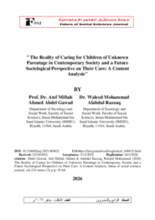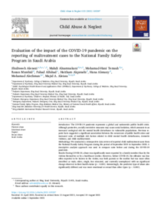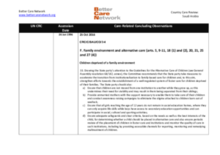Displaying 1 - 10 of 10
This study examines how children with unknown parentage are cared for in modern society and the societal risks they face, using analysis of existing research. It finds that factors such as religious beliefs, economic conditions, and post-birth abandonment—along with stigma and discrimination—significantly shape these children’s experiences, and calls for stronger reforms and increased investment in child welfare programs.
The piece reveals how children born to unmarried mothers in Saudi Arabia are routinely denied legal status, proper birth registration, healthcare and education because their existence challenges strict societal and legal norms.
The present qualitative study seeks to understand parents' perceptions of home or institutional care for children with disabilities. The study utilized an exploratory qualitative approach paradigm with five focus groups in the Qassim region of Saudi Arabia.
This report found that the types of abuse and the characteristics of both abused children and offenders in Saudi Arabia saw significant changes during the COVID-19 pandemic. Sexual and emotional abuses were reported more frequently, and the male gender is considered to feature more commonly in reports prior to the pandemic era than during the pandemic.
This qualitative study explored the accounts of 50 residential childcare staff in Saudi Arabia, aiming to identify ways in which staff and residential institutions may function as attachment objects for the children in their care.
The goal of this study was to assess the child maltreatment (CM) prevention readiness (CMPR) of the Kingdom of Saudi Arabia (KSA) in regard to implementing large-scale, evidence-based CM-prevention programs.
This country care review includes the care-related Concluding Observations adopted by the Committee on the Rights of the Child and the Committee on the Rights of Persons with Disabilities.
This article provides a review of indicators of child well-being in the six Gulf countries (Bahrain, Kuwait, Oman, Qatar, Saudi Arabia, and the United Arab Emirates), focusing on well-being in six domains: physical health, behavioral adjustment, psychological well-being, social relationships, safety, and cognitive well-being. The article highlights children's participation in decisions affecting their lives, relationships with parents and caregivers, and protection from abuse and neglect, among other indicators.
In this article, child protection managers and direct service workers in Saudi Arabia report their experiences in implementing new policies.
This chapter discusses the popular approaches used in the care of abandoned children and young people born without parents.




